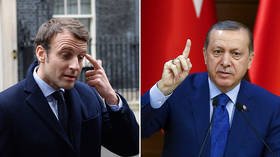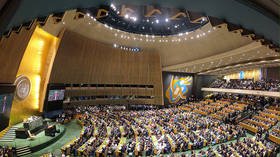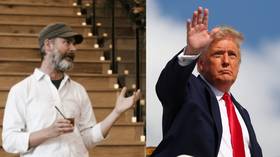Muslim boycott threats and politics play out in attacks on ‘mentally ill’ Macron as he ups the rhetoric against Islamists
The French President’s politically-loaded remarks over a teacher’s beheading have drawn insults from Muslim leaders across the world, but the ongoing battle between Islam and secular France remains very much a domestic concern.
President Emmanuel Macron brought down the wrath of Islam upon his own impeccably groomed head this weekend but amid all the insults, slurs and boycotts of French goods, we all know that behind the florid rhetoric this is just a storm dans une tasse de thé.
The president’s alleged offence was to tell those at last week’s national ceremony commemorating Samuel Paty that the teacher “was killed because Islamists want our future”, but that France would “not renounce our caricatures”.
In an undeniably emotional tribute, Macron said, “Samuel Paty was the victim of a macabre conspiracy of idiocy, of lies, of jumbled ideas, of hate of others, hate of who we are, deeply and existentially.”
For some, this was all too much.
Turkey’s President Recep Tayyip Erdogan, using the measured tones he is famed for, declared that Macron needed treatment for mental illness evidenced by his views on Islam. Erdogan, who is claimed to be the “most insulted” leader in the world, never holds back in dishing it out.
Imran Khan, the great cricketer but not-so-great Pakistani prime minister, puffed, “Pakistan condemns systematic Islamophobic campaign under the garb of freedom of expression,” and the Moroccan foreign ministry, likewise missing the point of ‘freedom’ in ‘freedom of expression’, similarly complained “freedom of expression cannot, for any reason, justify the insulting provocation and the insulting offense of the Muslim religion”.
Online photos showed shelves at the make-up counter of a Kuwaiti department store stripped of French products, apparently part of a Islamic-inspired boycott that has also taken off in Qatar and Jordan. Meanwhile, protests have apparently been seen in Lebanon, Syria and the Gaza Strip, though to the untrained eye, it might be hard to discern a street protest there from a busy shopping day.
But does any of this really make much difference? Macron clearly doesn’t think so and on Sunday, doubled down on his comments using the grandiose language he’s so fond of. “We will not give in, ever. We respect all differences in a spirit of peace. We do not accept hate speech and defend reasonable debate. We will always be on the side of human dignity and universal values,” he tweeted.
Also on rt.com Erdogan urges Turks to not buy French goods as companies brace for boycott by Muslim nationsHe knows these boycott calls, angry words and empty shelves - a cosmetic disposing of cosmetics, perhaps - might win their supporters a few headlines and some popular backing, but ultimately, they are meaningless. Because if the leaders are serious about penalising France, then surely hitting the country in the pocket in a meaningful way would drive home the message far more effectively.
What part of the long list of items that made up the US$6.6 billion in exports that France sends to Turkey on an annual basis should Erdogan dispense with? The iron and steel, the plastics, the cars or the aircraft? Hmmmm, let’s see. Where to start?
Or what about Morocco? It imported US$5.3 billion in goods from France in 2019. If the government there is really that angry, then it should pull the plug on all that electronic equipment, costing nearly a billion dollars last year, that it bought from its former colonial master.
Pakistan imports nearly half a billion dollars worth of French products, including tens of millions of dollars worth of medical apparatus and dairy products, including cheese. The last time President Khan suggested an import ban on cheese was back in 2018 and then he was met with a barrage of ridicule across social media, where it was suggested this was his futile attempt to 'Make Pakistan Grate Again'.
And then there’s France as a key supplier of military equipment to some of its other Muslim critics, such as Egypt and Saudi Arabia. Cairo accounted for 26% of France’s US$9.3bn in defence exports in 2019. Is the outrage going to lead to those arms being boycotted? I doubt it.
So what to make of all this uproar?
The Charlie Hebdo trial in France was always going to cause a stir, not least because as proceedings began the magazine publishers insisted on reprinting caricatures of the Prophet Muhammad which were, after all, at the centre of the 2015 massacre which left 17 people dead in three days and signalled a wave of atrocities that ultimately led to 250 deaths.
This reprint not only incurred the wrath of Al Qaeda which repeated its threats against the magazine publishers, it provoked the rage of one Islamist extremist to launch a meat cleaver attack on two innocent people who work in the publication’s former offices, which, of course, was followed by the gruesome beheading of teacher Samuel Paty outside the school where he worked.
The current tit-for-tat, boycott threats and name-calling is all just politics. Erdogan is struggling in the polls and insulting Macron brings the desired up-tick. Imran Khan has his own radical Islamists at home and defending Islam from an infidel President’s attack is politically astute.
And then we have Macron. While no doubt he delivered a heartfelt speech at Paty’s memorial ceremony, he too understands that politics in these days of the 24-hour news cycle has no down-time.
It’s not too much to suggest the President had at least half-a-mind on the fact that all the media attention on this issue will, no doubt, be central to the public debate in the months leading up to the French presidential elections in April 2022.
If he can match the rhetoric from abroad, keep a lid on the domestic violence that is never far from the surface of French society and prevent any further Islamist atrocities (there have been more than 30 such serious attacks in the last eight years), then that may be all that is needed to convince the people that he is in control.
Whether that is truly the case, however, is another thing altogether.
Think your friends would be interested? Share this story!
The statements, views and opinions expressed in this column are solely those of the author and do not necessarily represent those of RT.
















